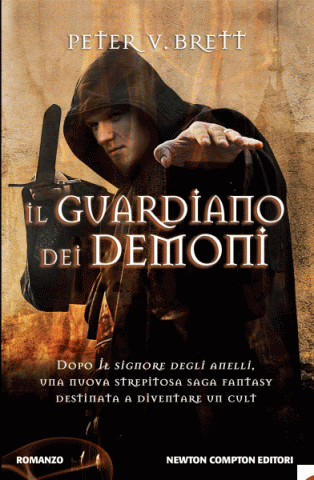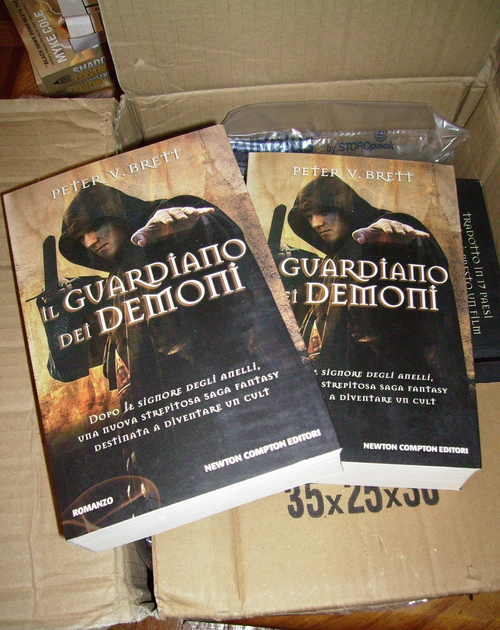Italian Interview
Posted by Rebecca and Meg
A blog in Italy, by the name of Wonderful Monsters (yes, the name is actually in English), did a cool interview with Peat about Il Guardiano dei Demoni, the Italian version of The Painted Man.
You’ll find some cool stuff in this interview, specifically what Peat thinks about all of the different titles for his books, and what he thinks about Il Guardiano dei Demoni.
You can find the original blog post here. But, if you aren’t quite fluent in Italian yet, read the English version below.
Italian Ciao Radio Interview
Peter V. Brett
What’s the genesis of this book?
The book originally started as a writing assignment in a class I was taking at New York University in 1998. The assignment was to write an original first chapter of a longer fantasy novel. I wrote a short chapter about a young boy named Arlen with wanderlust, but who had never been more than a few hours form home, because he needed to be home behind the magic wards by nightfall, when the demons came out.
I was working on the story from that point on, but something eluded me. I had created the world of demons and ward magic, but that wasn’t enough. I needed to understand how the people in this world responded to the ever-present fear that they were living under.
It wasn’t until years later, after September 11, 2001, that I started to understand fear. I was in New York City that day, and remember how everyone was afraid, but each responded to their fears differently. Some ran away. Others ran towards the scene to watch or offer help. Some people were frozen and indecisive, and others leapt into ill-advised action. This was something I pondered a great deal in the months and years that followed, and I think this heavily influenced the story. It is not a political or cultural commentary, but rather a study of fear and how it affects people.
Did you expect all this interest in your first book?
Not really. Writing is a very private endeavor, and one never really knows how readers will respond to their work. I always wanted to be a professional writer, but I thought it was just a dream and a hobby. I worked very hard on my stories, but even so, I was surprised to even get a literary agent to represent me. When the books sold to a major publisher, it was a dream come true, but even then I was expecting only moderate books. Now I am a bestseller published in 20 languages. I still have trouble believing that and keep expecting to wake up from the dream.
When you really think you will be a writer?
As I said, I wanted to be a writer since I was very young, perhaps nine or ten years old. I didn’t expect it to actually HAPPEN, but writing has always been what I loved to do, and I would keep doing it even if no one was reading.
The Italian name of the book is “The guardian of demons”: what do you think about it? You think it feets with the content of the book?
One of the things an author has to get used to is changing of their titles. Sometimes a publisher will change them before the book is first published, and even then, the name doesn’t always translate well. Even my English title is different in the US than it is in the UK. Even so, I have been very fortunate to have good titles in most every language. I think “The Guardian of Demons” is appropriate. In many translations, the magical wards that hold the demons back are called “guards”, and the story is about a man who tattoos those symbols on his skin.
Let’s talk about The Painted Man. Magic in your book is different from the one we are used to know: how is the genesis of the magic system in your book?
I have read a lot of fantasy novels, and had grown tired of wizards casting spells and throwing fire and lightning about. Magic sets the tone in fantasy stories, and in my opinion, it should enhance the stories rather than simply provide the hero with an easy escape at the end.
The use of magical symbols to ward off evil is not a new idea. It is something that has grown independently in most every culture in human history. What I did was take that idea, and apply a certain amount of science to it, creating hard rules of what it could (and could not) do, so the reader understands the power and isn’t.
In The Painted Man, people are threatened by Corelings: who are they and how can people defend from them?
In the story, mankind has been at war since the beginning of time with demons who live at the core of the world. These creatures, called corelings, cannot abide sunlight, but they come out at night to hunt. They come in different varieties, based on their elemental nature. Flame demons are small and quick and spit fire. Rock demons are large, slow, and incredibly strong and difficult to harm. Wind demons can fly. Et cetera.
Demons are creatures of magic, and are thus extremely difficult to kill. The only true defense is the use of magical symbols called wards that leech away some of the demons’ magic and turn it against them. For a time, humans were at war with the demons, and even winning, but then in a cunning plan, the demons stopped coming to the surface for many centuries, waiting until humans ceased to believe in them and forgot the magic that kept them safe. Only then did the corelings return, killing almost everyone and topping their industrial society. When the story begins, 300 years after this return, humans live in small pockets protected by wards, but the symbols that allow them to fight back are lost to history.
Only 3 children can do something to it seems that nothing can defeat them but the last hope is entrusted to three kids: what’s their role in the story?
The story centers around three characters, Arlen, Leesha, and Rojer, each of whom has been scarred (either physically or emotionally) by a demon event in their childhood that shapes the people they will become.
Arlen, disgusted by the cowardice that leads to the deaths of some people close to him, runs away from home, vowing to become a warrior and find the lost combat wards that will allow people to fight demons once more.
Leesha, whose idyllic small town life is destroyed by the lies of her fiancée, finds her calling in healing after a demon attack leaves many of her townsfolk injured.
Lastly there is Rojer, orphaned when he was only three years old. Rojer is apprenticed to a drunken traveling entertainer, and discovers that his music can affect the corelings in strange ways.
May you tell us something about next book, Desert Spear (we hope soon will be published also in Italy)?
The Desert Spear is focused on a character from The Painted Man named Ahmann Jardir. Jardir was something of a villain in the first book, but the Desert Spear delves into his childhood and shows how the man in the first book was shaped, and how he is, in his own way, just as much a hero as Arlen or Leesha or Rojer. The book also has all of the characters from the first book, and continues their adventures forward. Having finally discovered how to fight the corelings, they are shocked when the demons respond with unexpected cunning.
We have read that this book will be a movie: what can you tell us about that?
The books have all been optioned by director Paul WS Anderson and Producer Jeremy Bolt (Resident Evil, Pandorum, 3 Musketeers). They showed incredible faith in the series right from the start, and offered a bold vision of how it might translate to the screen that impressed me greatly. We are all very excited to work on the project, which is currently in pre-production and being pitched to major studios. Hopefully sometime soon it will move forward.
Finally I leave you a space to send a message to your Italian fans.
My mother is Italian, and told me that while she felt proud for achieving my dream every time I sold a book in any language, the Italian version is the most precious to her. I can’t wait to receive my author copies so I can give her one. So thank you, Italian readers! Your support means a great deal to our family!
In the Mail
We also just received a whole box of Il Guardiano dei Demoni in the mail the other day. They are looking pretty fancy!



I love that there are so many different covers across the world.
I should probably order one of these ones off the net for my mom. She’d probably enjoy it better in her home tongue. Sometimes, when she reads my books, I feel like the message isn’t getting across to her properly. Thirty years in this country and she’s still so foreign. LOVE THAT WOMAN!